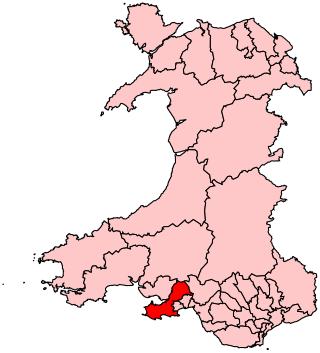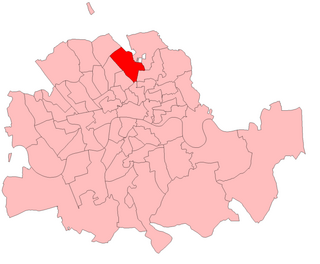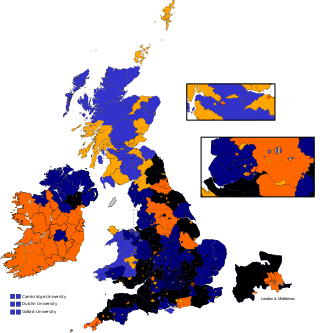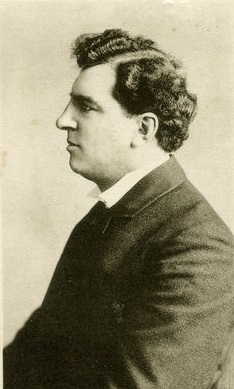History
Following the creation of the seat in 1885, there was a contest for the nomination. Following a meeting at Pontypridd, a number of candidates were proposed and invited to address public meetings. They included T. Marchant Williams, Lewis Morris and the Rev Aaron Davies. [1] Ultimately the two leading candidates proved to be Alfred Thomas, a prominent figure in the public life of Cardiff, where he had served as Mayor in 1881–2, and William Bowen Rowlands, a Pembrokeshire-born lawyer. After a contest lasting several months, Rowlands withdrew, ostensibly to prevent a split in the Liberal vote following the appearance of a Conservative candidate. However, Rowlands was regarded as far less radical than his opponent. [2] A leading Baptist, Thomas's victory owed much to his nonconformist connections, upon which this 'amiable and benevolent man' based much of his political outlook.
From the outset the Liberal Association in the constituency was constituted as 'The Liberal and Labour Association', and for 25 years Thomas held the seat without any significant threat from advocates of direct labour representation. As late as 1908 it held a perfunctory annual meeting where little significant business was transacted. The Conservatives put up a credible fight in 1892, 1895 and 1900, but in 1906 Thomas was returned unopposed.
By the end of the first decade of the twentieth century there were rumours that Thomas would retire and in 1907, Evan Thomas, a miners' agent, was nominated to contest the seat once the sitting member stood down. Thomas was. however, an ordained Baptist minister, and hardly regarded as a firebrand. Ultimately, however, Thomas denied to contest the January 1910 general election and comfortably saw off a Conservative challenger.
In April 1910, Thomas announced his retirement at the next General Election. [7] The Liberal Association eschewed an opportunity to select a working man, with their chairman declaring that 'neither a Tory nor a Socialist should occupy the seat'. [7] They opted for Clement Edwards. As a result, Charles Butt Stanton, miners' agent in the Aberdare Valley and a member of Aberdare Urban District Council emerged as a labour candidate but failed to win the endorsement of the Miners' Federation of Great Britain executive. He was beaten into third place.
At the General Election expected in 1915, Edwards would have been opposed by Alfred Onions. treasurer of the South Wales Miners' Federation. However, the war intervened, and by the 1918 General Election the seat had been abolished following extensive boundary changes and the creation of the new constituencies of Caerphilly and Pontypridd which would ultimately become Labour strongholds.

Gower is a constituency created in 1885 and represented in the House of Commons of the UK Parliament by one Member of Parliament (MP). Tonia Antoniazzi of the Labour Party became its MP after winning it from a Conservative in the 2017 UK general election. Her party had previously represented the seat from 1909 until 2015.

Rhondda is a constituency represented in the House of Commons of the UK Parliament since 2001 by Chris Bryant of the Labour Party.
Liverpool Exchange was a borough constituency within the city of Liverpool in England, centred on Liverpool Exchange railway station. It returned one Member of Parliament (MP) to the House of Commons of the Parliament of the United Kingdom, elected by the first past the post system.
Luton was a constituency including the town of Luton in Bedfordshire. It returned one Member of Parliament (MP) to the House of Commons of the UK Parliament, elected by the first past the post system 1885–1950 and for 24 years thereafter.
Birmingham East was a parliamentary constituency in the city of Birmingham, England. It returned one Member of Parliament (MP) to the House of Commons of the Parliament of the United Kingdom, elected by the first-past-the-post voting system.

Alfred Thomas, 1st Baron Pontypridd, was a Welsh Liberal Party politician, who served as MP for East Glamorganshire from 1885 until 1910, when he was elevated to the peerage as Lord Pontypridd.

Islington East was a constituency which returned one Member of Parliament (MP) to the House of Commons of the Parliament of the United Kingdom from 1885, until it was abolished for the February 1974 general election.
Merthyr Tydfil was a parliamentary constituency centred on the town of Merthyr Tydfil in Glamorgan. From 1832 to 1868 it returned one Member of Parliament (MP) to the House of Commons of the Parliament of the United Kingdom, and in 1868 this was increased to two members. The two-member constituency was abolished for the 1918 general election.
Thornbury was a county constituency centred on the town of Thornbury in Gloucestershire. It returned one Member of Parliament (MP) to the House of Commons of the Parliament of the United Kingdom, elected by the first past the post voting system.

East Norfolk was a constituency in the county of Norfolk that returned two members of parliament to the House of Commons of the Parliament of the United Kingdom until 1868. A namesake was created in 1885 with representation of one member. That seat was abolished in 1950.
Birmingham Bordesley was a borough constituency in the city of Birmingham, which returned one Member of Parliament (MP) to the House of Commons of the Parliament of the United Kingdom. Elections were held using the first-past-the-post voting system.

Ealing was a parliamentary constituency centred on the Ealing district of west London. It returned one Member of Parliament (MP) to the House of Commons of the UK Parliament, 1885–1945. In common with metropolitan areas the seat saw major population increase. Until 1918 it included Chiswick, Acton within the County of London, and part of Hanwell in the rump of dwindling Middlesex.
South Glamorganshire was a parliamentary constituency in Glamorganshire, Wales. It returned one Member of Parliament (MP) to the House of Commons of the Parliament of the United Kingdom, elected by the first past the post system.
Mid Glamorganshire was a county constituency in Glamorganshire, Wales. It returned one Member of Parliament (MP) to the House of Commons of the Parliament of the United Kingdom, elected by the first past the post system.
Western Monmouthshire was a parliamentary constituency in Monmouthshire. It returned one Member of Parliament (MP) to the House of Commons of the Parliament of the United Kingdom.
Southern Monmouthshire was a parliamentary constituency in Monmouthshire. It returned one Member of Parliament (MP) to the House of Commons of the Parliament of the United Kingdom.
Wandsworth was the name of a borough constituency created in 1885, abolished in 1918, covering the vast bulk of today's London Borough of Wandsworth in South London but excluding Battersea. It returned one Member of Parliament (MP) to the House of Commons of the UK Parliament.
East Northamptonshire was a county constituency in Northamptonshire, which returned one Member of Parliament (MP) to the House of Commons of the Parliament of the United Kingdom.
The 1915 Merthyr Tydfil by-election was a parliamentary by-election held on 25 November 1915 for the British House of Commons constituency of Merthyr Tydfil in Glamorganshire, Wales.

George Hay Morgan was a British Liberal Party politician.
This page is based on this
Wikipedia article Text is available under the
CC BY-SA 4.0 license; additional terms may apply.
Images, videos and audio are available under their respective licenses.










